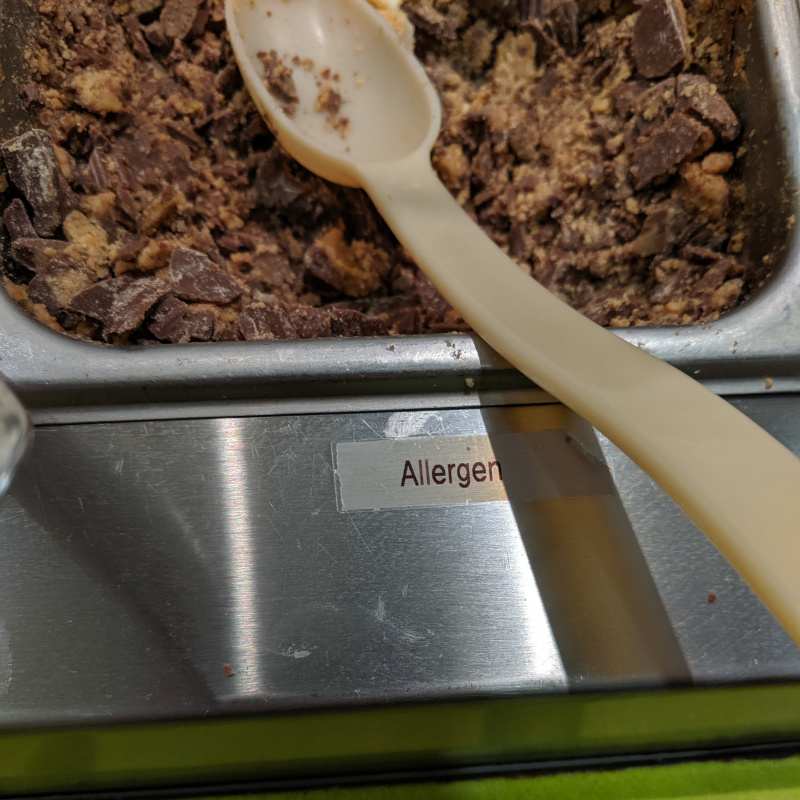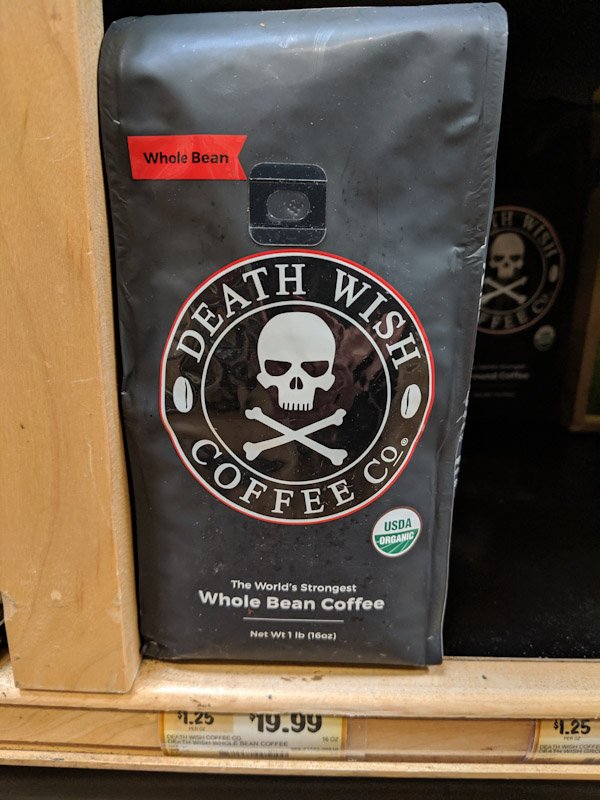
I found this photo on my phone from sometime last year, back when you could still go to self-serve frozen yogurt/ice cream places. The label is…well…TBH it’s accurate, if a bit vague…

I found this photo on my phone from sometime last year, back when you could still go to self-serve frozen yogurt/ice cream places. The label is…well…TBH it’s accurate, if a bit vague…

I found a folder of unsorted photos from my 2010-2013 phone last night and started going through them. I found several gems, like this one!
Found this at the grocery store. I, um, guess that answers the question of what coffee to serve with Death By Chocolate cake.

Discussion of food allergies tends to focus on children (for a lot of reasons), but a recent study found a much higher rate of food allergies among adults than expected. They found that 10.8 percent of American adults – that extrapolates to 26 million people! — reported a convincing food allergy (based on actual symptoms reported – another 9% reported allergies, but their symptoms didn’t match the diagnosis – presumably at least some of the rest are genuine intolerances). That’s actually higher than the rate among children found by another recent study, which came up with 7.6%.
Now, my first thought on reading this was: Of course! Kids with food allergies who were counted 10, 20, 30 years ago have grown up, and we’re adults now! But it’s more than that: There’s a lot more adult-onset allergies than anyone expected to find.
The JAMA article goes into the numbers. Of those who had a convincing allergy:
More than a quarter of adults with food allergies didn’t have them as children. That’s a surprise! And it raises questions: Is there a different mechanism that triggers childhood-onset allergies vs. adult-onset? (Other than tick bites, of course.) What about those of us who had allergies already and added more? Is there some sort of saturation threshold?
There are still a lot of unknowns about food allergies. But we do know that they can be deadly serious, and they affect a lot of people.
If you have environmental allergies to pollen, dust, animals, etc. you’ve long had the option of taking shots to desensitize yourself to the allergen. That hasn’t been the case for food allergies. But a pollen allergy is a lot less likely to kill you than a nut allergy. Some sort of treatment beyond “try not to eat it, and use epinephrine if you do” has been sought after for a long time.
Various forms of oral immunotherapy (OIT, SLIT) for desensitization have been under study for a few years…along with an injected medication that takes a different approach.
Around 10-15 years ago, my allergist at the time brought up the possibility of Xolair (omalizumab) for my asthma, suggesting it might also help with my food allergies. It’s an IgE inhibitor, which means it blocks the pathway through which food allergies operate. In theory, it would reduce my chances (or reduce the intensity) of a severe reaction to an accidental exposure.
It was an unproven, off-label use. Xolair had only been studied and approved for treating asthma, primarily asthma that other medication couldn’t control. And it would mean regular shots. And staying in the office after each one to make sure I didn’t have a reaction to the shot itself.
Ultimately I decided not to take her up on it. It seemed like more trouble than I wanted to go to for an uncertain gain. My experience wouldn’t have even helped clarify that gain. Any close calls I missed would have just been another anecdote, the medication’s impact unproven.
A decade and a bunch of clinical trials later (some alone, some in combination with OIT), the FDA has given Xolair a “breakthrough therapy designation” for treating food allergies. That means fast-tracking further reviews and development as a treatment. (more detailed article.)
There’s still risk/benefit analysis to do (in general and on a case by case basis), but things are starting to finally look up in terms of being able to treat the condition instead of trying to detour around it!
OK, this is a bit morbid, but bear with me.
Most news stories about deaths from food allergies feature children or teenagers, maybe young adults in their twenties. You read about grieving parents. You rarely read about the 40-year-old who leaves behind a grieving spouse and kids.
Food allergies send a lot of people to the emergency room: 200,000 annually in the US alone according to FARE. Almost all are successfully treated. But people do die from anaphylaxis, roughly 63–99 each year in the US according to AAAAI.
So why are the fatalities we hear about so young?
Is it just demographics? Allergy prevalence has been increasing, after all, so kids are more likely to have food allergies than adults are.
Newsworthiness? A three-year-old dying at day care tugs at the heartstrings in a way that a 38-year-old dying from takeout doesn’t.
Is it onset age? A reaction is more likely to kill you if you don’t know about the allergy yet, don’t know you need to carry epinephrine, and don’t know that the warning signs mean “hospital now!” and not just “lie down and try to get through the asthma attack.” By the time you’re an adult, you’ve probably already encountered everything you might be allergic to, so you’re less likely to get that surprise first reaction. It happens – I’ve known people who developed shellfish allergies as adults, and I found my own nut and peanut allergies expanding their range in my early 20s – and there’s the Lone Star tick – but it’s less likely.
Are adults more careful? Teenagers take more risks. Children often have to rely on secondary caregivers who don’t always have the training or understanding that their parents do. And of course, the longer you deal with something, the more it becomes second nature. Is it that we’ve gotten better at avoiding triggers, keeping our medication on hand, and seeking treatment faster?
Are you more likely to have died of something else in the meantime? According to one NIH study, “Fatal food anaphylaxis for a food-allergic person is rarer than accidental death in the general population.” So the longer you live, as long as you’re taking precautions with the allergy, chances are that something else will kill you before the allergy can.
I suspect all of these are factors, but I do wonder how they balance.
Silly as it sounds to recall nuts for undeclared nuts, not all nuts are the same.
If you’re allergic to cashews but not pecans, you want to know whether the pecans you might eat have come in contact with cashews. And that’s not even getting into the peanut/tree nut difference!
In this case [Edit: link broken], a process breakdown at a roaster opened up everything to cross-contamination by every other kind of nut they sell. They’re recalling affected lots while they fix the problem.